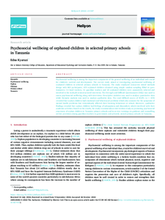Displaying 1351 - 1360 of 14555
Linking adoption to abortion so casually, with no further elaboration, reveals a particular view of the world. The logic seems so clear: Lots of parents want to adopt babies, the babies who will no longer be aborted could be those babies. Two incredibly complex social issues, one easy almost-beautifully reductive solution. But of course, the reality isn’t so simple.
On 25 September 2022, a referendum was held in Cuba to approve the Family Code 2022. The historic new legislation, which is widely celebrated as one of the “most progressive codes of families”, provides important, strengthened measures for the protection of children and adolescents across the country.
The latest Family Matters report released by the Secretariat of National Aboriginal and Islander Child Care, an Australian non-governmental peak body for Aboriginal and Torres Strait Islander children – reveals that there are there more than 22,000 Aboriginal and Torres Strait Islander children in out-of-home care.
No part of Scotland was “immune” to abuse of children in foster care over more than eight decades, an inquiry has heard. The Scottish Child Abuse Inquiry (SCAI) has been told of physical, sexual, psychological and emotional abuse, neglect and exploitation since public hearings for the foster care case study opened in May.
This report presents the findings of an online survey and individual interviews which explored the experiences of carers providing out-of-home care to infants in New South Wales. While there is increasing research related to the care of children and young people requiring out-of-home Care, there is comparatively less specifically related to the care of infants. The findings highlight a need to provide increased training, support, and resources for new carers of infants in out-of-home care.
This study aimed at investigating the psychosocial wellbeing of orphaned children in selected primary schools in Tanzania.
This World Health Organization report, "What works to prevent online violence against children", presents ways to address the growing worldwide concern of keeping children safe online, with a specific focus on two forms of online violence: child sexual abuse including grooming and sexual image abuse; and cyber aggression and harassment in the form of cyberbullying, cyberstalking, hacking and identity theft. The report recommends implementing school-based educational programmes that have multiple sessions, promote interaction among youth and engage parents.
This is the third report by Coram Voice and The Rees Centre at University of Oxford exploring learning from the Your Life, Your Care surveys that are part of the Bright Spots Programme. It is an analysis of 9,472 responses from children and young people (aged 4-18 years) collected between 2016 and 2021 from 38 Local Authorities in England. The findings build on previous overview reports and the pilot stage in 2015 that involved 611 children and young people. By 2021, the research team had gathered over 10,000 voices from children in care in England.
These are the key findings and recommendations of a report produced by Coram Voice and The Rees Centre at University of Oxford that captures the views of 10,000 children and young people in care in the UK on their wellbeing. This report summarises responses collected through the largest survey of its kind from children and young people aged 4-18 years between 2016 and 2021, giving unprecedented insight into children in care’s subjective wellbeing.
This report produced by Coram Voice and the NYAS (National Youth Advocacy Service) captures the views of care-experienced children and young people in the UK on recommendations set out in the independent review of children’s social care in England.






